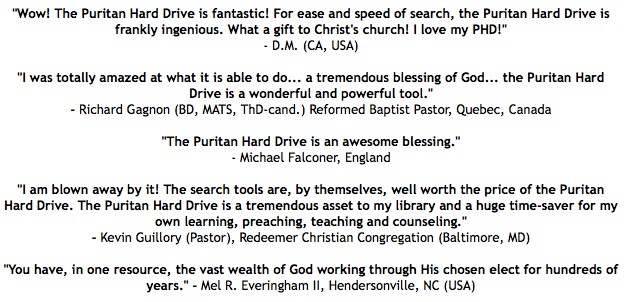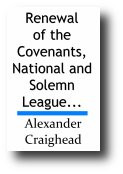 Loading... Please wait...
Loading... Please wait...- SWRB Home
-
Free Resources
- Short Listings Of Free Reformation & Creation Resources
- Free Reformed, Puritan, Covenanter and Creationist Videos
- Thousands of Links to Free Audio, Video and Printed Resources
- Free Puritan Books, Reformed MP3s, and Calvinist Videos
- Puritan Quotes, Free Reformation MP3s, Reformed Books and Calvinist Videos From PuritanDownloads.com On FaceBook
- Shipping & Returns
- Blog
- Privacy Policy
- Contact Us
- Payment Options
- Help
-
About Us
- Sitemap
Pastor Scott Brown, on the left in the video above, is the Director of the National Center for Family-Integrated Churches (NCFIC)
Resource Categories
- PURITAN HARD DRIVE REVIEWS
- PASTOR ROB VENTURA ON THE PURITAN HARD DRIVE
- DR. VODDIE BAUCHAM, JR. ON THE PURITAN HARD DRIVE
- R. C. SPROUL ON SWRB
- DR. JOEL R. BEEKE ON THE PURITAN HARD DRIVE
- PASTOR GREG L. PRICE ON THE PURITAN HARD DRIVE
- DR. MATTHEW MCMAHON ON THE PURITAN HARD DRIVE
- PASTOR SCOTT BROWN ON THE PURITAN HARD DRIVE
- PASTOR W. J. MENCAROW ON THE PURITAN HARD DRIVE
- JOAQUIN FERNANDEZ ON THE PURITAN HARD DRIVE
- PASTOR DAVID SILVERSIDES ON THE PURITAN HARD DRIVE
- JOHN HENDRYX ON THE PURITAN HARD DRIVE
- PASTOR KEVIN GUILLORY ON THE PURITAN HARD DRIVE
- RICHARD BENNETT ON THE PURITAN HARD DRIVE
- DR. KENNY RHODES ON THE PURITAN HARD DRIVE
- JUSTIN RAWSON ON THE PURITAN HARD DRIVE
- PASTOR JAMES WALLACE ON THE PURITAN HARD DRIVE
- PASTOR RICHARD GAGNON ON THE PURITAN HARD DRIVE
- PASTOR JOE HAYNES ON THE PURITAN HARD DRIVE
- DR. STEVEN DILDAY ON THE PURITAN HARD DRIVE
- PASTOR ANDREW COMPTON ON THE PURITAN HARD DRIVE
- TERENCE ELLARD ON THE PURITAN HARD DRIVE
- PASTOR JERRY JOHNSON ON THE PURITAN HARD DRIVE
- PASTOR DAVID PETRIE ON THE PURITAN HARD DRIVE
- JIM DODSON ON THE PURITAN HARD DRIVE
- PASTOR BRIAN SCHWERTLEY ON THE PURITAN HARD DRIVE
- PASTOR PHIL GIBSON ON THE PURITAN HARD DRIVE
- MEL R. EVERINGHAM II ON THE PURITAN HARD DRIVE
- PAUL BLYTH ON THE PURITAN HARD DRIVE
- STEVE KETTLER ON THE PURITAN HARD DRIVE
- D. M. (CALIFORNIA) ON THE PURITAN HARD DRIVE
- MICHAEL CAUGHRAN ON THE PURITAN HARD DRIVE
- WIILIAM NOPPER IV ON THE PURITAN HARD DRIVE
- LINDA THERIAULT ON THE PURITAN HARD DRIVE
- WILLIAM WARNOCK ON THE PURITAN HARD DRIVE
- ROBERT KOH ON THE PURITAN HARD DRIVE
- WHAT'S ON THE PURITAN HARD DRIVE?
- ALL PURITAN HARD DRIVE VIDEOS
- PHD-ODE INSTALLATION VIDEOS
- COMMENTS ON SWRB
- ALL PURITAN QUOTE VIDEOS
- PURITAN HARD DRIVE SCREENSHOTS
- PURITAN HARD DRIVE MINISTRY AND DONATION OFFERS
- TABLE OF RESOURCE CATEGORIES
- Advanced Studies
- SWRB SERMONAUDIO MOBILE APP
- Apologetics
- Assurance
- Attributes and Holiness of God
- Augustine
- Banner of Truth
- Baptism
- Beginners
- Bibles (Geneva, KJV, Hexapla, etc.)
- Biblical Counseling
- BIBLICAL HD COLLECTION
- Biblical Interpretation (Hermeneutics)
- Biographies and Autobiographies
- Calvinism and the Sovereignty of God
- CALVINISM HD COLLECTION
- CALVINIST CLASSICS HD COLLECTION
- Charles Spurgeon
- Children's Books
- CHRISTIAN EDUCATION HD COLLECTION
- Christian History
- Church Government
- Civil Government and Resistance
- CLASSIC CHRISTIAN HD COLLECTION
- Classic Puritan and Reformed Sets
- Commentaries
- Contemporary Issues
- Covenant Theology and Covenanting
- COVENANTER HD COLLECTION
- Covenanters and Covenanted Reformation
- Creation and Creationism
- Creeds, Confessions and Covenants
- Cults, False Religions, Psychology, Humanism
- Dealing with Affliction, Suffering, and Sickness
- Debates
- Dutch Reformed
- Education and Home Schooling
- English Puritans, Covenanters and Reformers
- Family, Children, Home, and Family Worship
- First Reformation
- Five Points of Calvinism (TULIP)
- For Pastors and Elders
- For Seminary Students
- FREE PURITAN & REFORMATION MP3 AUDIO SERMONS/BOOKS
- FREE PURITAN BOOKS, REFORMATION MP3s, PDFs, VIDEOs
- George Gillespie
- God's Law, The Ten Commandments, etc.
- Greg L. Price on Headcoverings
- Heaven, Hell and the Final Judgment
- Holy Days (Lord's Day, Christmas, Easter, etc.)
- HOME SCHOOL HD COLLECTION
- Intermediate Studies
- John Bunyan
- John Calvin
- John Knox
- John Owen
- Jonathan Edwards
- Justification
- Languages, Dictionaries, Reference, etc.
- LOOK WHO LOVES THE PURITAN HARD DRIVE
- Lord's Supper (Communion)
- Marriage, Courtship, etc.
- Martin Luther and Lutheranism
- Martyrs and Persecution
- Other Protestant Works
- Predestination and Providence
- PRESBYTERIAN HD COLLECTION
- Presbyterians and Presbyterianism
- Prophecy, Antichrist, and Eschatology
- PROTESTANT HD COLLECTION
- PSALM SINGING MP3s (COMPLETE SET)
- Psalters, Psalm Singing and Music
- Puritan Facts
- PURITAN FAST SERMONS (1640-1653) - 34 VOLS SET
- Puritan Fast Sermons 1640-1653
- Puritans and Puritanism
- PURITAN HARD DRIVE
- REFORMATION HD COLLECTION
- Reformation History
- Reformed and Puritan Classics
- Reformed Baptist
- REFORMED BAPTIST HD COLLECTION
- REFORMED HD COLLECTION
- REFORMED PRESBYTERIAN HD COLLECTION
- Reformed Presbytery, RPNA Protesters, etc.
- Reformed Theology
- Reformed Worship, The Regulative Principle, etc.
- Roman Catholicism, the Jesuits, Islam, etc.
- Salvation and Evangelism
- Samuel Rutherford
- Sanctification, Prayer and Holiness
- Scottish Covenanters
- Scottish Presbyterianism
- Scripture Song MP3s (Psalms and Bibles Verses)
- Second Reformation
- Separation, Unity, Uniformity, etc.
- Sermons and Sermon Collections
- Solemn League and Covenant
- Theology and Doctrine
- Third Reformation
- Thomas Watson
- Westminster Confession, Assembly and Divines
- Authors (All A to Z)
Phone Orders:
(780) 450-3730
To obtain free Reformation books, Puritan MP3s and Calvinistic videos, SWRB discount coupons, etc., add yourself to SWRB's Puritan and Reformed email list by using the form above.
Renewal of the Covenants, National and Solemn League; A Confession of Sins; An Engagement to Duties; and a Testimony; as they were Carried on at Middle Octorara in Pennsylvania, November 11, 1743 (1748) by Alexander Craighead
Resource Details
Resource Description
A fascinating Covenanter document proclaiming that "[t]o the Calvinistic system of principles, and the Presbyterian form of government, this nation (the United States) is largely indebted for its civil independence and republican polity. John Calvin and John Knox are the real founders of American liberties. Their teachings, plainly deducible from the Word of God, were disseminated by the persecuted remnant of the Church of Scotland, and were generally incorporated in the structure of American independence."
Furthermore, Glasgow, in his introduction, points out that Craighead's covenanting work formed a basis for the national Declaration of Independence, which followed shortly thereafter.
According to a reliable author (Wheeler's Reminiscences, p. 278) Thomas Jefferson says in his autobiography that when he was engaged in preparing the National Declaration of Independence, that he and his colleagues searched everywhere for formulas, and that the printed proceedings of Octorara, as well as the Mecklenburg Declaration, were before him, and that he freely used ideas therein contained.
It is difficult to determine, therefore, the real author of American Independence. Undoubtedly the principles of the Covenanters at Octarara in 1743, the sentiments of the Presbyterians at Charlotte in 1775, and the Declaration submitted by Jefferson in 1776, contain one and the same great principles. 'Honor to whom honor is due.'"
We may rightfully declare our independence of wicked men and rebellious nations, but we cannot declare our independence of God, and set up a government regardless of His authority, without incurring His wrath and suffering from His desolating judgements. 'Blessed is the nation whose God is the Lord.'"
This rare book contains much that is exceedingly valuable and the section titled "The Declaration, Protestation, and Testimony of a Suffering Remnant of the Anti-Popish, Anti-Lutheran, Anti-Prelatic, Anti-Erastian, Anti-Latitu-dinarian, Anti-Sectarian, True Presbyterian Church of Christ, in America," is well worth the price of the book itself.
With Glasgow, we set this book forth "[t]rusting that his work will be of historical value to all Covenanters, and interesting to all other readers," with the hope of "enkindling a flame of love for the glorious principles of the Word of God, and arousing an interest in the great work of National Reformation."
All resources for sale on this website, with the exception of Scottish Metrical Psalms MP3s, are available on the Puritan Hard Drive .
VIDEO INTRODUCTION TO THE PURITAN HARD DRIVE


Phone Orders:
(780) 450-3730
To obtain free Reformation books, Puritan MP3s and Calvinistic videos, SWRB discount coupons, etc., add yourself to SWRB's Puritan and Reformed email list by using the form above.








































